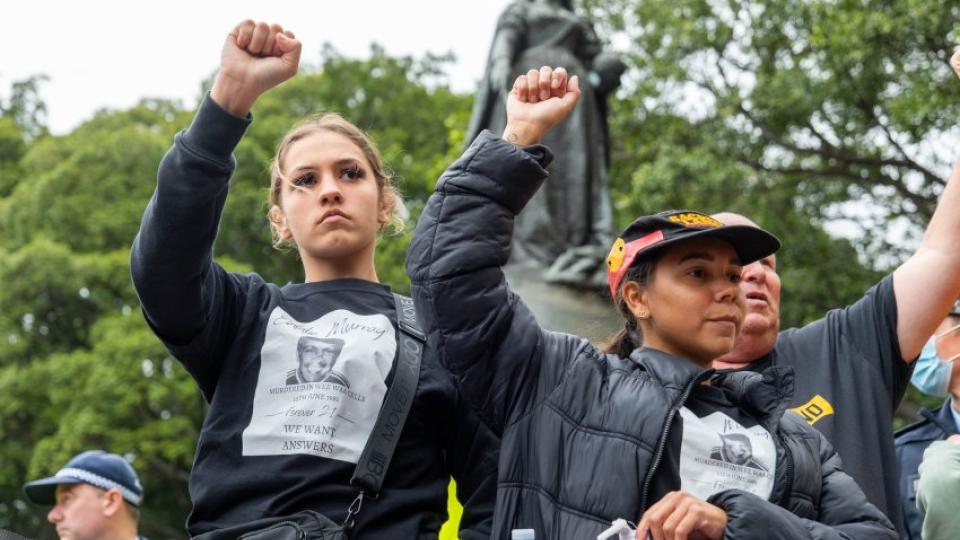Invasion Day 2023: The struggle for First Nations justice and sovereignty continues

This Invasion Day comes as the Anthony Albanese Labor government prepares to hold a referendum to amend the Constitution to establish an “Aboriginal and Torres Strait Islander Voice” to make representations to parliament and the federal government on “matters relating to Aboriginal and Torres Strait Islander Peoples”.
Essentially, the objective is simply to set up another First Nations advisory body to the federal government. But if the referendum succeeds, this body will be part of the constitution.
Previous advisory bodies have been formed, restructured or abolished by various governments.
The National Aboriginal Consultative Committee (NACC), established by the Whitlam Labor government in 1973, was restructured into the National Aboriginal Conference by the subsequent Malcolm Fraser Coalition government. It was finally abolished by the Hawke Labor government in 1985 after it put up resistance to that government’s moves to weaken land rights.
The Hawke government set up the Aboriginal and Torres Strait Islander Commission as a new advisory body in 1989, but it too was abolished by the John Howard Coalition government in 2005.
Even if the Voice is established through a successful referendum, it is parliament that will be given the “power to make laws with respect to the composition, functions, powers and procedures of the Aboriginal and Torres Strait Islander Voice”.
The only constitutional protection the Voice will have is its existence!
Will the Albanese government and future governments listen to and seriously act on the representations of such a constitutionally-established advisory body?
The historical record shows that Labor and Coalition governments consistently resisted any proposals from these advisory bodies. But, at its best moments, the NACC helped mobilise First Nations resistance to the weakening of the limited land rights that had been won through popular struggles.
Given this history, it is unsurprising that the Voice proposal faces critical voices from militant First Nations activists.
They have seen the previous token gestures to address the oppression of First Nations peoples that instead demobilised rising movements for First Nations justice.
They have seen that despite such token gestures, First Nations communities suffer the most poverty and have the poorest health and education — the goal of sovereignty remains as distant as ever.
The latest official data, collated by the Productivity Commission for the National Agreement on Closing the Gap, confirms the worsening situation for First Nations people’s education, removals from families, incarceration and suicide rates.
Dr BJ Newtown, a Wiradjuri woman heading Bring Them Home — the first-ever First Nations-led research project into child removals in New South Wales — pointed out recently that First Nations children are 10 times more likely to be removed than other children.
According to the latest data from the Australian Bureau of Statistics, the imprisonment rate for First Nations people in the September 2022 quarter was 2354 persons per 100,000 adults, compared with 202 persons per 100,000 adults for the whole population.
The First Nations imprisonment rate rose from the previous quarter in every state except Tasmania (where it fell slightly) and South Australia where it was “stable”.
The First Nations imprisonment rate was highest in Western Australia (3623 per 100,000) and the Northern Territory (3174 per 100,000).
First Nations children are 49% of the population in juvenile detention centres, according to Australian Institute of Health and Welfare, although they comprise only 5.8% of all young people aged 10–17.
The Australian Institute of Criminology’s 2022 annual report states there have been 516 First Nations deaths in custody since the 1991 Royal Commission into Aboriginal Deaths in Custody. While shocking, this is not surprising as most of the 339 recommendations of that royal commission have yet to be implemented.
Meanwhile, the attacks on First Nations’ land and sea rights by mining and other corporate interests are relentless.
From the Burrup in north-western Western Australia to the Narrabri coal seam gas project in New South Wales and the Adani coal project in Queensland, multinational mining companies are aggressively fighting First Nations communities to push ahead with mega fossil fuel projects, with the support of Labor and Coalition governments.
The Albanese government’s proposed Aboriginal and Torres Strait Islander Voice to Parliament could end up as yet another token gesture, unless there is an ongoing strong and independent movement in the streets for real First Nations justice.
[Peter Boyle is a member of the Socialist Alliance National Executive.]